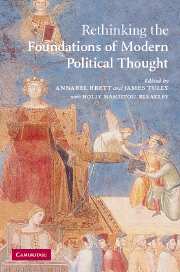Book contents
- Frontmatter
- Contents
- List of contributors
- Preface
- Part I Introduction
- Part II Rethinking the foundations
- 3 Foundations and moments
- 4 Skinner, pre-humanist rhetorical culture and Machiavelli
- 5 Unoriginal authors: how to do things with texts in the Renaissance
- 6 ‘The Best State of the Commonwealth’: Thomas More and Quentin Skinner
- 7 Scholasticism in Quentin Skinner's Foundations
- 8 Scholastic political thought and the modern concept of the state
- 9 ‘So meerly humane’: theories of resistance in early-modern Europe
- 10 Hobbes and democracy
- 11 A lion in the house: Hobbes and democracy
- 12 Hobbes and the foundations of modern international thought
- 13 Surveying The Foundations: a retrospect and reassessment
- Bibliography
- Index
5 - Unoriginal authors: how to do things with texts in the Renaissance
Published online by Cambridge University Press: 19 February 2010
- Frontmatter
- Contents
- List of contributors
- Preface
- Part I Introduction
- Part II Rethinking the foundations
- 3 Foundations and moments
- 4 Skinner, pre-humanist rhetorical culture and Machiavelli
- 5 Unoriginal authors: how to do things with texts in the Renaissance
- 6 ‘The Best State of the Commonwealth’: Thomas More and Quentin Skinner
- 7 Scholasticism in Quentin Skinner's Foundations
- 8 Scholastic political thought and the modern concept of the state
- 9 ‘So meerly humane’: theories of resistance in early-modern Europe
- 10 Hobbes and democracy
- 11 A lion in the house: Hobbes and democracy
- 12 Hobbes and the foundations of modern international thought
- 13 Surveying The Foundations: a retrospect and reassessment
- Bibliography
- Index
Summary
The first volume of The Foundations of Modern Political Thought offered a new account of the relationship between rhetorical resources and political moments. Quentin Skinner balanced attention to the normative traditions of political language with attention to the new force they acquire at critical times. The first part of this chapter argues that the balance had a specific controversial origin. In the late 1960s and early 1970s, Hans Baron's thesis that the political crisis of the early Florentine quattrocento had been the catalyst for a new humanism came into conflict with Paul Oskar Kristeller's restatement of the continuities between medieval and Renaissance, ecclesiastical and lay traditions of rhetoric and thought. Skinner took the academic community beyond these encamped positions with his historical account of the instrumentality of political rhetoric. One always had to ask what a given ‘author’ was doing in his particular moment, how he was exploiting handed-on rhetorical resources to build a position on a current issue or crisis.
The second half of this chapter aims to reconsider Skinner's model in the light of subsequent advances in textual studies. It uses works from the second half of the sixteenth century (Philip Sidney's Arcadia and A Letter to Queen Elizabeth, Etienne de la Boétie's De la servitude volontaire and Montaigne's Essais), a period when the circulation and publication of manuscript and printed texts coexisted in a hazardous and censorious environment. For Skinner shares one important methodological assumption with more traditional scholars of political thought like Baron.
- Type
- Chapter
- Information
- Rethinking The Foundations of Modern Political Thought , pp. 73 - 92Publisher: Cambridge University PressPrint publication year: 2006
- 2
- Cited by

